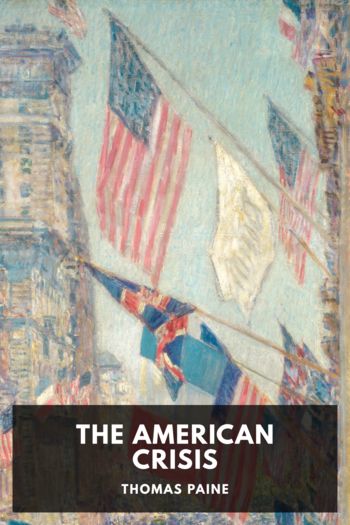The American Crisis, Thomas Paine [pdf to ebook reader TXT] 📗

- Author: Thomas Paine
Book online «The American Crisis, Thomas Paine [pdf to ebook reader TXT] 📗». Author Thomas Paine
While I am on the subject of the currency, I shall offer one remark which will appear true to everybody, and can be accounted for by nobody, which is, that the better the times were, the worse the money grew; and the worse the times were, the better the money stood. It never depreciated by any advantage obtained by the enemy. The troubles of 1776, and the loss of Philadelphia in 1777, made no sensible impression on it, and everyone knows that the surrender of Charleston did not produce the least alteration in the rate of exchange, which, for long before, and for more than three months after, stood at sixty for one. It seems as if the certainty of its being our own, made us careless of its value, and that the most distant thoughts of losing it made us hug it the closer, like something we were loth to part with; or that we depreciate it for our pastime, which, when called to seriousness by the enemy, we leave off to renew again at our leisure. In short, our good luck seems to break us, and our bad makes us whole.
Passing on from this digression, I shall now endeavor to bring into one view the several parts which I have already stated, and form thereon some propositions, and conclude.
I have placed before the reader, the average tax per head, paid by the people of England; which is forty shillings sterling.
And I have shown the rate on an average per head, which will defray all the expenses of the war to us, and support the several governments without running the country into debt, which is thirteen shillings and four pence.
I have shown what the peace establishment may be conducted for, viz., an eighth part of what it would be, if under the government of Britain.
And I have likewise shown what the average per head of the present taxes is, namely, three shillings and fivepence sterling, or threepence two-fifths per month; and that their whole yearly value, in sterling, is only sixty-four thousand two hundred and eighty pounds. Whereas our quota, to keep the payments equal with the expenses, is two hundred and fifty thousand pounds. Consequently, there is a deficiency of one hundred and eighty-five thousand seven hundred and twenty pounds, and the same proportion of defect, according to the several quotas, happens in every other state. And this defect is the cause why the army has been so indifferently fed, clothed and paid. It is the cause, likewise, of the nerveless state of the campaign, and the insecurity of the country. Now, if a tax equal to thirteen and fourpence per head, will remove all these difficulties, and make people secure in their homes, leave them to follow the business of their stores and farms unmolested, and not only drive out but keep out the enemy from the country; and if the neglect of raising this sum will let them in, and produce the evils which might be prevented—on which side, I ask, does the wisdom, interest and policy lie? Or, rather, would it not be an insult to reason, to put the question? The sum, when proportioned out according to the several abilities of the people, can hurt no one, but an inroad from the enemy ruins hundreds of families.
Look at the destruction done in this city [Philadelphia]. The many houses totally destroyed, and others damaged; the waste of fences in the country round it, besides the plunder of furniture, forage, and provisions. I do not suppose that half a million sterling would reinstate the sufferers; and, does this, I ask, bear any proportion to the expense that would make us secure? The damage, on an average, is at least ten pounds sterling per head, which is as much as thirteen shillings and fourpence per head comes to for fifteen years. The same has happened on the frontiers, and in the Jerseys, New York, and other places where the enemy has been—Carolina and Georgia are likewise suffering the same fate.
That the people generally do not understand the insufficiency of the taxes to carry on the war, is evident, not only from common observation, but from the construction of several petitions which were presented to the Assembly of this state, against the recommendation of Congress of the 18th of March last, for taking up and funding the present currency at forty to one, and issuing new money in its stead. The prayer of the petition was, that the currency might be appreciated by taxes (meaning the present taxes) and that part of the taxes be applied to the support of the army, if the army could not be otherwise supported. Now it could not have been possible for such a petition to have been presented, had the petitioners known, that so far from part of the taxes being sufficient for the support of the whole of them falls three-fourths short of the year’s expenses.
Before I proceed to propose methods by which a sufficiency of money may be raised, I shall take a short view of the general state of the country.
Notwithstanding the weight of the war, the ravages of the enemy, and the obstructions she has thrown in the way of trade and commerce, so soon does a young country outgrow misfortune, that America has already surmounted many that heavily oppressed her.





Comments (0)